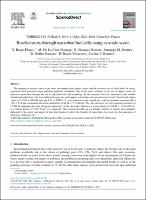Bioelectricity through microbial fuel cells using avocado waste

View/
Author(s)
Rojas-Flores, S.
De La Cruz-Noriega, M.
Nazario-Naveda, R.
Benites, Santiago M.
Delfín-Narciso, D.
Rojas-Villacorta, W.
Romero, Cecilia V.
Date
2022-06-25Metadata
Show full item recordPublisher
Elsevier
Journal
Energy Reports
Abstract
The dumping of organic waste in the areas surrounding food supply centers and the excessive use of fossil fuels for energy
generation have generated major pollution problems worldwide. One of the novel solutions is the use of organic waste for
electricity generation through the use of microbial fuel cell technology. In this research, low-cost, laboratory-scale, doublechamber microbial fuel cells were fabricated using zinc and copper as electrodes and avocado waste as fuel. Current and voltage
values of 3.7326 ± 0.05568 mA and 0.74 ± 0.02121 V were achieved on the seventh day, with an optimum operating pH of
5.98 ± 0.16 and a maximum electrical conductivity of 94.46 ± 5.12 mS/cm. The cells showed a very low operating resistance of
71.480 , indicating the good electrical conductivity of the electrodes. Likewise, a power density of 566.80 ± 13.48 mW/cm2
at a current density of 5.165 A/cm2 was generated. This research provides an eco-friendly solution to farmers and companies
dedicated to the export and import of this fruit because it shows the benefits of using their own waste for the generation of
electricity, reducing costs.
Type
info:eu-repo/semantics/article
Rights
info:eu-repo/semantics/openAccess
Language
eng

